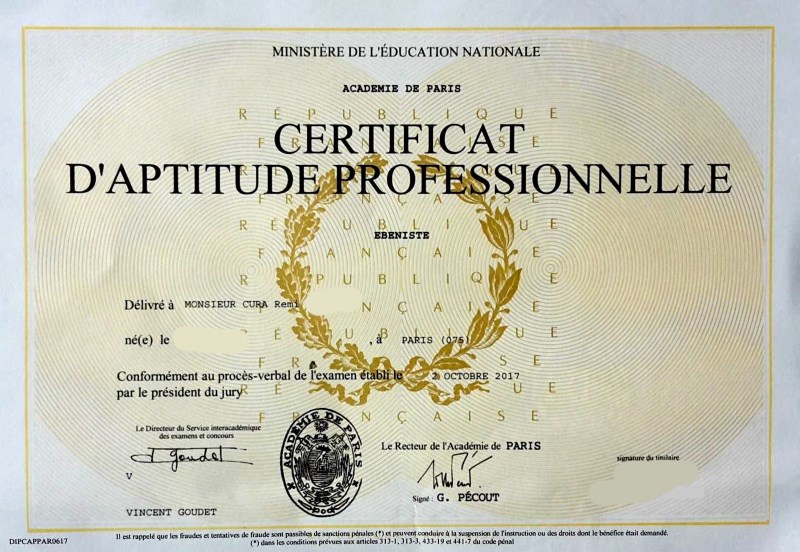
I successfully passed my CAP (certificate of professional competence) for woodworking (ebeniste). The CAP is a basic French diploma that enables to work in own shop or at a company, and basically be autonomous in designing/building a furniture that may have veneer. I passed the option “ebeniste”, which is quite hard to translate, maybe cabinetmaker, maybe fine woodworker, it has to do with veneer management, precision, and proficiency with hand tools.
This formation is usually done in one-year full time. I chose to learn what I could on my free time in a nice association where retired woodworkers teach to other wood lovers. I read several books more or less vintage on woodworking subjects, woodworking history and woodworking styles. That, and lots of practice for my other woodworking projects.
There was several topics for this exam. One part is about theory:
- general knowledge about trees and wood, wood products, joinery, tools, process, security, etc.
- technical manual drawing while respecting iso formalism, and formalism specific to cabinetmaking, using technical pens.
- knowledge of furniture styles period to current style (Renaissance, Louis 13, Louis 14, Regence, Louis 15, Louis 16, Empire, Restauration, Louis-Philippe, Napoleon 3, Belle epoque, Art deco, Design).
- analysis of style and artistic propositions for a piece of furniture and a context.
- Given a furniture, how to build it (which tools in which order + settings).
Another part is about actual woodworking, the exam being 3 full days long. This year we built a minimalist desktop with 2 tables and a drawer.
- analyse building documentation for the furniture that will be built.
- build the furniture, including usage of all classical woodworking tools (both stationary and portable electric tools)
- including veneer work, including classical patterning (radial, frame, molding)
- including handmade hidden dovetails.
- including proficiency with a wood shaper (0.1mm settings precision in less than 20 min)
Overall, preparing for this exam and passing it was quite challenging. Besides the obvious challenge due to time constraint (I did not spend a full year on it!), it was also quite hard to obtain reliable information on stuff like furniture styles (no reference book!), technical drawing, etc. Surprisingly, the reference book for cabinetmaking (French style) is from 1960!
I also had to learn how to draw to present design ideas and concepts for a furniture. I found this part very useful in many matters beside woodworking.
Last, I spend a large amount of time finding and preparing tools for the exam. Hand planes, chisel, drawing knife, measuring tools, etc. Most of the things bought in flea market or the French craiglist, then refurbished.
It was a very interesting experiment, because it pushed me to explore and formalize a lot of things I had been doing intuitively but without too much thinking.